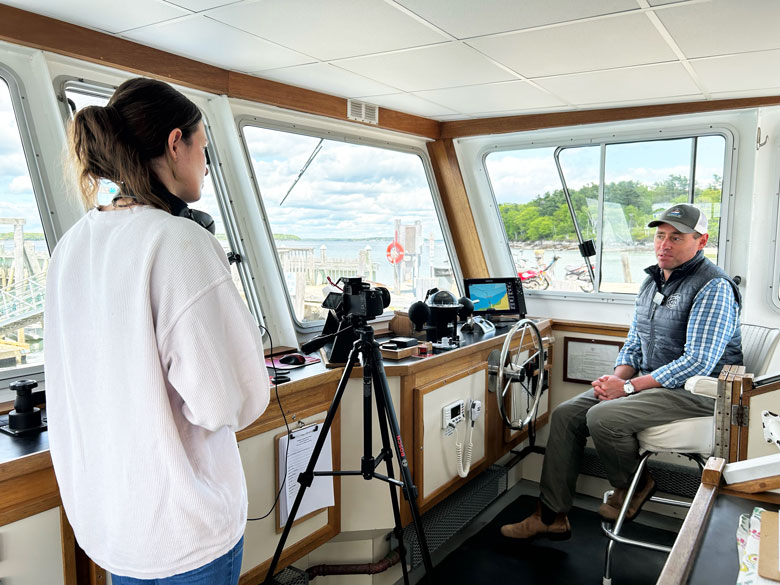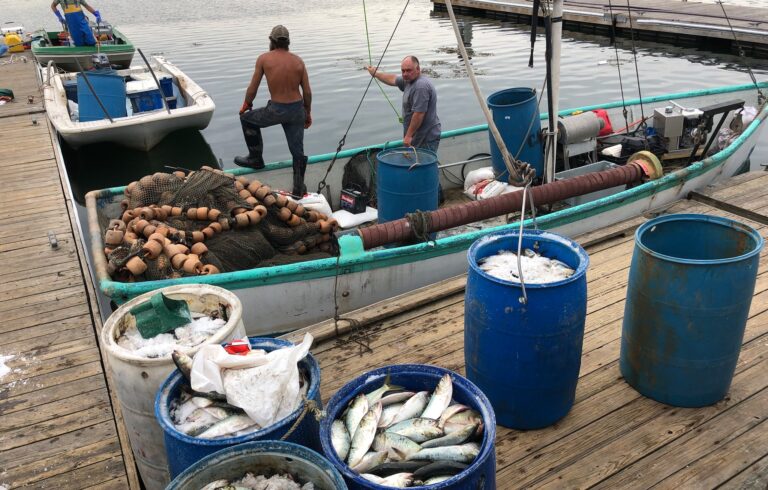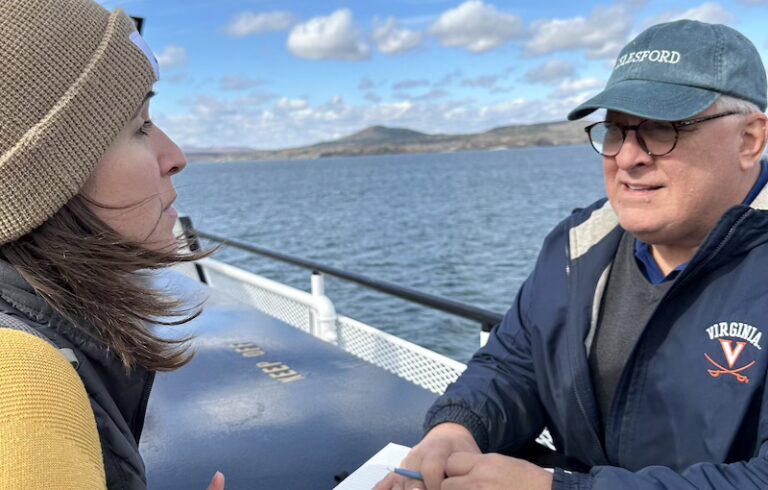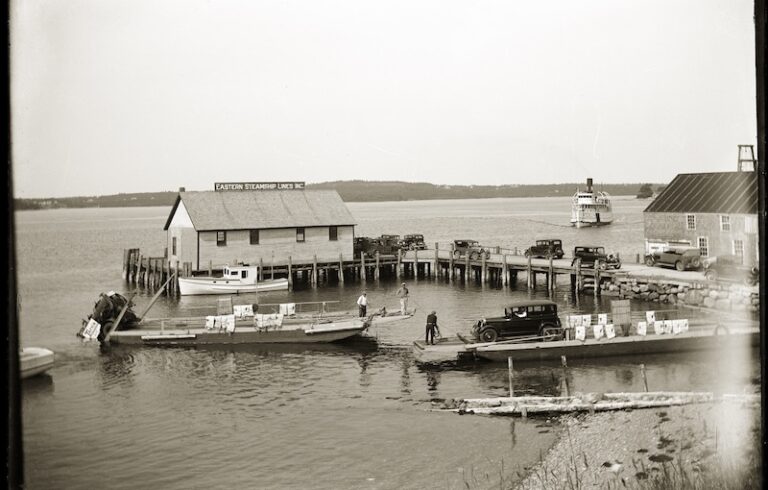On April 15, 1975, the Chebeague Transportation Company (CTC) carried its first passengers on the 1.7-mile ride between Chebeague and Cousins islands.
Over the next half-century, the company has fulfilled its original mission of providing safe and reliable year-round service to residents and visitors to the unbridged island in Casco Bay.
To celebrate this milestone, Chebeaguers gathered on July 19 for a birthday party and to watch the new documentary, Lifeline of an Island, chronicling the role CTC has played in the community.
Today, CTC transports more than 140,000 passengers annually, owns two ferries, operates a barging service, manages two parking lots, and maintains a fleet of shuttle buses. The company handles 90% of all travel to and from the island. (Casco Bay Lines also serves Chebeague.)
“I just can’t imagine the island without a CTC,” says Carol Sabasteanski, who was named the first general manager of the company, retiring in 2020. “It is its lifeline.”
“If we didn’t have safe, reliable service, this island would become a summer place.”
—Donna Damon
CTC operates 4,000 regularly scheduled trips a year. In addition to transporting islanders, off-island workers, summer residents, visitors and school students, CTC also provides 24-hour emergency service, working closely with Chebeague’s volunteer rescue squad.
“The most critical part of CTC is the rescue,” says George “Cap” Leonard, one of the founders of the CTC and a former board member. “It is the principal lifeline of Chebeague Island.”
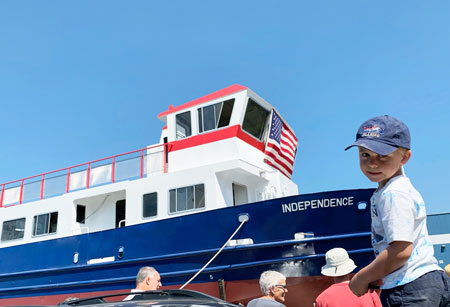
CTC crews are on duty 24/7 to respond to emergencies, transporting the sick and injured to Cousins Island. Additionally, CTC transports law enforcement personnel to the island as needed.
The importance of ferry access goes beyond emergencies. It is a vital connection that sustains the year-round community, which numbers about 400 people. With 11 regularly scheduled trips daily, the CTC ferry is the “bridge” to the mainland, enabling islanders to commute to work , shop, and manage other necessities.
“Boat access is essential,” says Donna Damon, a Chebeague native and island historian. “If we didn’t have safe, reliable service, this island would become a summer place.”
This is particularly important for island families with children, she continues. “It is very important for kids to have access to the mainland,” to be able to participate in after-school activities, sports, “to be part of the bigger world.”
Leonard and Damon both credit CTC for being responsive to community input. “CTC is part of the fabric of the members of this community,” according to Leonard. As an independent transit company, it is able to respond to needs as they change.
Established in 1971 as a for-profit company, CTC’s shareholders (eventually numbering 2,500 people) always insisted that any profits be plowed back into the operation to sustain it financially. CTC converted to nonprofit status in 2014.
The company currently employs 27 people, eight of them full-time, including boat captains, deckhands, bus drivers, and parking lot attendants.
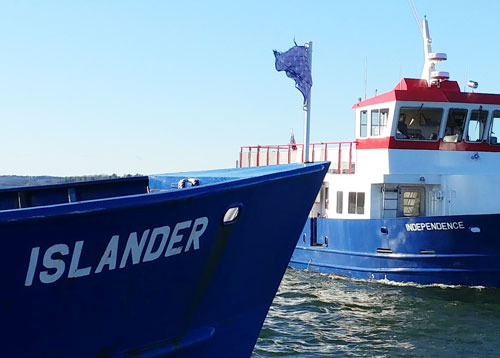
CTCs primary ferry is the 52-foot-long, steel-hulled Independence, built by Washburn & Doughty of East Boothbay and launched in 2019. The $1.2- million vessel replaced CTC’s 35-year-old ferry, the Islander, which now serves as the company’s backup vessel.
At the time, the Islander, also built by Washburn & Doughty, had logged 408,000 miles, almost all on the 15-minute trip between Chebeague and Cousins islands.
Beyond its practical role and daily transportation duties, the ferry also doubles as a popular gathering place for passengers. While the ferry ride is a fact of life for long-time islanders, it provides the opportunity to catch up with friends, finish a grocery list, or to just relax.
It is also a source of some good stories. Long-time CTC deckhand Kim Munroe has a wealth of them. Including one about the forgotten child.
“Someone forgot their daughter at Cousins Island, sleeping in the freight shed [on the wharf],” recounts Munroe. “It was the last boat of the evening. We got halfway across, and all of the sudden the mother is like, ‘Oh my God, my daughter’s sleeping in the shed!’ So, we turned around and got her. She was very mad at her mother.”
And there was the first-time traveler who arrived on Chebeague at high tide, returning the next morning, demanding to know what Munroe had “done with all the water.”
In 2013, shortly after moving with his family to Chebeague, Matt Ridgway was hired as a CTC ferry captain.
“To have an opportunity to work within the community, on board the ferry, with what I thought—and still think—is one of the most important jobs to support this community, was just a great opportunity.” In 2020, Ridgway was named general manager.
“Our mission is to support the community by providing safe and reliable transportation,” says Ridgway. “That’s really our sole purpose, to support the community by doing what we know how to do and what we’re good at.”
The documentary Lifeline of An Island can be viewed on CTC’s website
www.ctcferry.org/50years
Laura Hamilton, a native of Chebeague, is a University of Southern Maine graduate and was videographer for Lifeline of an Island.
